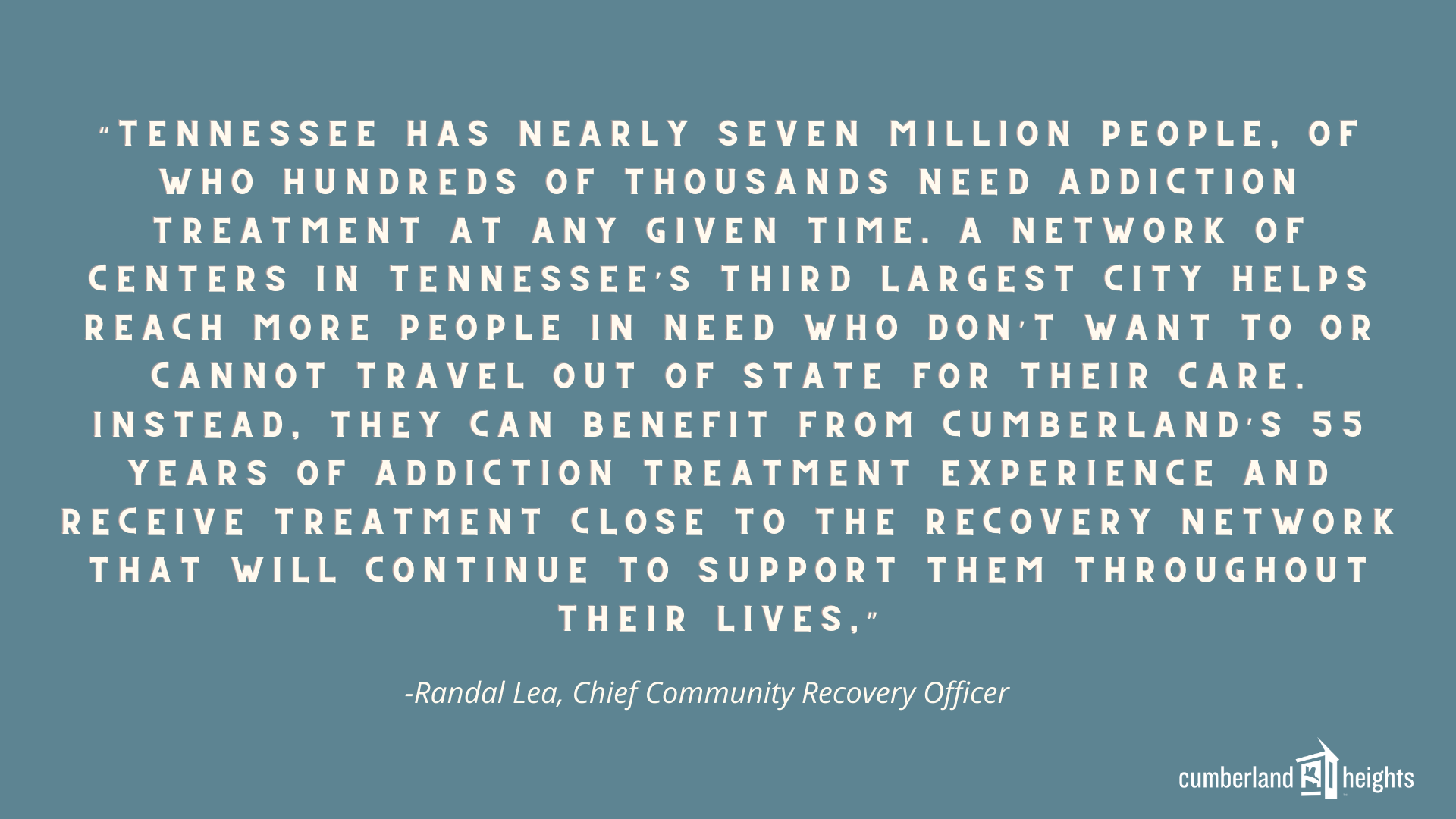Seeking recovery from a substance use disorder is not a “one size fits all” kind of approach. Just as you would get a unique, specialized plan from your doctor to treat a cancer diagnosis, the addiction recovery experts at Cumberland Heights will develop a plan based on your specific needs. Residential treatment isn’t the right path for everyone. That’s why we are proud to have 15 outpatient recovery centers across the state of Tennessee, this most recent to open in Knoxville.
“Because addiction is a chronic illness, the recovery path continues beyond a residential treatment stay. At different times following treatment, people benefit from structure treatment support while they integrate back into home or work – and in some cases, they benefit from treatment without leaving home or work. Having a vast network means more people can continue their recovery journey with the same trusted provider,” said Chief Community Officer Randal Lea.
We felt Knoxville was in need of this type of facility in the community, especially because of the record number of overdose calls in recent years.
“Tennessee has nearly seven million people, of who hundreds of thousands need addiction treatment at any given time. A network of centers in Tennessee’s third largest city helps reach more people in need who don’t want to or cannot travel out of state for their care. Instead, they can benefit from Cumberland’s 55 years of addiction treatment experience and receive treatment close to the recovery network that will continue to support them throughout their lives,” said Lea.

Unlike residential treatment, in which patients stay on our River Road campus for the duration of their treatment, patients enrolled in outpatient services spend time at the facility for three hours a day, four days a week. Inpatient vs outpatient level of care recommendations are largely made on a case by case basis and are based on factors such as drugs of choice, use history, and precipitating factors to seeking treatment. At Cumberland Heights, assessors meet with patients to identify their unique needs in order to make the best level of care recommendation for the patient.
One element we do feel is crucial to everyone in treatment, both inpatient and outpatient is family involvement.
“Family counseling is an important component of recovery as this is most people’s main source of support. Family education and processing time is important to help gain back trust, begin to build healthier communication styles, and understanding of relapse warning signs and relapse prevention.
Our ORC program focuses on the whole person emotionally, mentally, spiritually and physically. We look at how addiction has impacted each of these things and how one impacts the other. We work on treating the whole person,” said Licensed Counselor Erin Borden.
We offer once a week family educational groups (currently via Zoom). The famillies are able to participate with their loved one and other clients and their family members to gain education on topics such as communication, boundaries, family roles, the disease concept, and relapse/relapse prevention. We also make referrals for continuing family therapy once the outpatient program is complete.
Of course, Covid-19 presented us with many challenges in the last year, but we’ve remained steadfast in our commitment to treat those struggling. Cumberland Heights has gone great lengths to ensure the health and safety of our patients. In March 2020, all ORC groups were converted to a Telehealth format. Since that time, a few in-person groups have been opened including thie one, and those groups follow strict guidelines for safety. Patients receive temperature checks upon entering the building, answer a series of questions to assess for possible exposure, are socially distanced, and are always required to wear masks. Group sizes are also limited to ensure patients have room to socially distance appropriately.
“We are at a time when people have more choice about the type of treatment they receive and the method – be it online or in person. Either way, people seeking treatment need people they can rely on, either through technology or through live contact. Cumberland continues to be set apart by the people committed to the mission of this quiet innovator in the treatment field since 1966,” said Lea.










